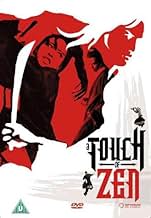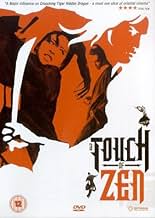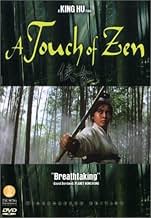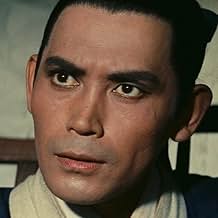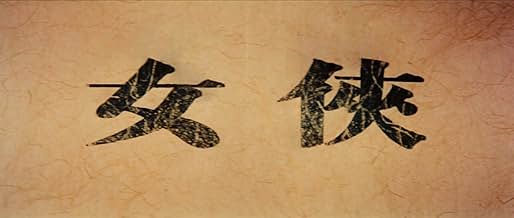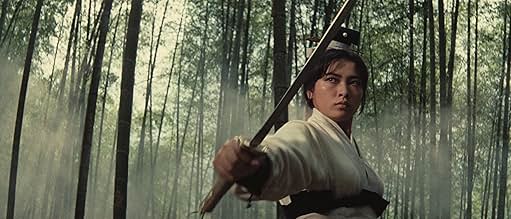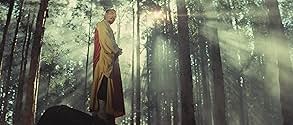Une femme fugitive fuyant des fonctionnaires corrompus du gouvernement est rejointe dans ses efforts par un peintre sans ambition et des moines bouddhistes qualifiés.Une femme fugitive fuyant des fonctionnaires corrompus du gouvernement est rejointe dans ses efforts par un peintre sans ambition et des moines bouddhistes qualifiés.Une femme fugitive fuyant des fonctionnaires corrompus du gouvernement est rejointe dans ses efforts par un peintre sans ambition et des moines bouddhistes qualifiés.
- Réalisation
- Scénario
- Casting principal
- Récompenses
- 2 victoires et 1 nomination au total
Avis à la une
The film is carefully structured, in three contrasting sections. It is only when you look back that you realize just how cleverly King Hu has created those three sections. The same characters, for the most part, appear in each section, but each focuses on a different combination. The first section focuses on the artist Ku, slowly building a picture of a quiet life in a rural backwater. The second switches tempo, with amazing martial arts action focusing on the fugitive Ku and her friends. The final section calms down again, as the mysterious Buddhist monk comes into sharp focus, and the martial arts become more and more amazing.
All this takes place in the most beautiful Chinese countryside, sometimes bathed in light (the use of sunlight and the monk is particularly impressive) and sometimes in dramatic thunderstorms, making the film even more of a delight to watch. Don't be put off by the 'kung-fu' label, this is even better than "Crouching Dragon, Hidden Tiger".
Despite the epic length, it doesn't feel like a traditional epic. It more felt like two - or maybe even three - plots sort of smooshed together. And on top of that, each third of the film is very distinct. The first third has no action and is sort of like a period drama/mystery. The second third is more straightforward martial arts fare, feeling very similar to another of King Hu's films, Dragon Inn (which isn't necessarily a bad thing). The final third retains the action but takes thing in a really interesting surreal/spiritual/maybe even psychological direction. It's hard to put into words, but it leaves an impact.
I wouldn't call this poorly written, but the distinctive acts and more than one plot all combined together did create something of a disjointed feeling. It didn't make the movie harder to get through, as I only realised it wasn't entirely cohesive right at the end, but it's worth mentioning. The first third might have been a tad slow, too. But after an hour, there's no point where it feels like things drag.
Thankfully everything else is close to perfect. For starters, it's visually stunning. It has some of the best lighting I think I've ever seen, with night scenes looking realistically dark (without things being impossible to see), and all the scenes during the day are just gorgeous. All the great landscapes help, too.
The action satisfies and all the performances and characters are quite good. Very good music, too. On a rewatch I might not be bothered by some of those unusual screenplay decisions, but even with that minor criticism, this is still an amazing movie, and probably among the best martial arts movies I've ever seen.
Aside from the philosophical points, ZEN also scores strongly in establishing mood, suspense, and fascinating visuals. The Jiang Hu in this film feels incredibly authentic, and the rich mise-en-scene is refreshing compared to the limited Shaw Bros studio offerings. I loved the photography throughout; it beautifully captures the spiritual wonder of ancient Orient. In framing still shots, King Hu chiefly employs medium and medium close-ups, mounting his camera at an upward angle so we can always see beyond the characters, perhaps to suggest existence of higher wisdom.
One observation I would like to propose is that although ZEN is probably a milestone in Chinese cinema, it would be a minor masterpiece compared to the best works from 60s Japan. The lush photography and haunting images from KWAIDAN come to mind as a comparison. No doubt, King Hu also learned a few tricks from the likes of Kurosawa, such as pointing his camera at the sun which occurs frequently in ZEN.
[9/10]
P.S.
This movie is awesome. A magical experience caught on celluloid. A true treasure.
It is over three hours long; the first hour is mainly scene-setting and not much happens, but this just adds to the impact. All you could want in a film is here - tension, action, arty filmwork, a kind of love interest, action, beautifully choreographed fights, intrigue, action, comedy, philosophy.... and a monk who is so pure that when he is wounded he bleeds.... well, you'd better see for yourself what he bleeds.
A must-see (if you have three hours to spare).
Le saviez-vous
- AnecdotesDirector King Hu had a full village constructed for the opening half of the movie, and then left it alone for nine months to give it a weathered look.
- GaffesThe film is set in the 14th century AD. However, the Gu family have maize (corn) drying outside their house - this crop is American in origin and did not reach China until the 16th century.
- Citations
Ku Shen Chai: Have you seen Miss Yang, the lady who lives here?
General Shih Wen-chiao: No, I'm blind.
Ku Shen Chai: Forgive me.
General Shih Wen-chiao: Miss Yang and her mother are gone.
Ku Shen Chai: Mr. Shih! She said you should run for your life too. Do you know where she went?
Ku Shen Chai: I have to find her!
[Shih pulls out a sword as two soldiers fly down from the sky and attack, but are quickly killed in a few brief strokes of the sword]
Ku Shen Chai: Mr. Shih! Mr. Shih, who are you really?
General Shih Wen-chiao: I'm not blind, that's for sure.
- Versions alternativesA Touch Of Zen was originally released in Taiwan in two parts with a total running time of 3 hours 20 minutes. However, the bamboo forest sequence which ended part one was reprised at the beginning of part two, adding over 20 minutes to the total running time. When the two parts were combined by King Hu without any repeated scenes in 1975, the resulting total time was 3 hours. The 2015 4K restoration from the original negative runs 2 hours 59 minutes.
- ConnexionsFeatured in La menace (1977)
Meilleurs choix
- How long is A Touch of Zen?Alimenté par Alexa
Détails
- Date de sortie
- Pays d’origine
- Langue
- Aussi connu sous le nom de
- Les héroïques
- Lieux de tournage
- Taroko National Park, Hualien, Taïwan(monastery and river canyon)
- Sociétés de production
- Voir plus de crédits d'entreprise sur IMDbPro
- Durée
- 3h 20min(200 min)
- Mixage
- Rapport de forme
- 2.35 : 1


